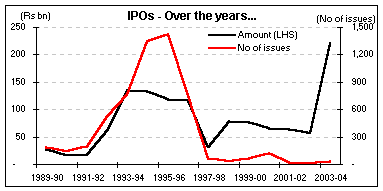
Home > Business > Business Headline > Report
IPOs: It's your money, honey!
November 02, 2004 12:46 IST
The Indian economy, since liberalisation (circa 1991), has changed for everyone to see. And the major catalysts to this change were that the Indian companies were free to grow their businesses. Between financial year 93-94 and financial year 96-97, the corporate sector went into overdrive and as a result, the country saw rapid industrialisation. However, the rapid growth was not without setbacks. The period post the rapid industrialization was followed by economic downturn that resulted in overcapacity (the overall global scenario was also weak). Indian companies, however, tided over this lean period and have emerged stronger and leaner and are now training their sights on the global market place. The spate of acquisitions internationally substantiates this argument. The latest being the acquisition of Tyco's global telecom network by VSNL. Indian companies, enthused by the strong growth in domestic demand as well as increasing opportunities in the global marketplace, are increasingly looking at the capital markets to fund their growth plans. For any global acquisition, companies need currency i.e. capital to fund their acquisitions. There are mainly two ways of raising capital i.e. debt and equity. The graph below indicates the trend as far as initial public offerings are concerned, over the last 16 years. The trend indicates that during the period of rapid industrialization (between FY94 and FY97), the number of equity IPOs and the amount raised have been the highest compared to the rest of the timeline. In the current scenario, Indian Inc is on the verge of another investment cycle and we may see them hitting the primary market soon in order to raise capital to fund growth for the future. Financial year 2003-04 already highlights that fact, wherein the amount raised by equity IPO offerings has been the highest compared to the last 16 years (albeit skewed by the public offerings of public sector companies). Conservative estimates indicate that in FY05, spilling over in to FY06, nearly Rs 300 billion of additional equity capital could be raised by Indian corporates.  This is a healthy sign as far as the Indian economy is concerned. However, investors have to be cautious at this stage and learn from past lessons. Besides equity, expansion is also funded by borrowings because equity is one of the costliest sources of funding for any corporates. So, what investors may miss out is the overall capital employed (debt plus equity). Investors need to understand that any economy works in cycles and only companies that are able to manage these business cycles well will emerge winners. In this context, investors need to ask some key questions at this stage. Why is a particular company raising capital (demand and supply projections)? What are its investment or expansion plans? How it is going to impact the debt to equity ratio of the same? What is the debt service coverage ratio of the company and how will it be impacted after the additional capital is raised? What is the period in which returns from the new investment will start showing? What is the cost of debt as well as equity being raised?
Click here to read our 'Checklist for IPO investors' and to know how IPOs are performing? Source: Prime Database Web siteThese basic questions will help the investor understand the rationale behind a company's move to raise capital and will also help him/her to decide whether it makes sense to stay invested in the company. Also, at the end of the day, the competence of the management also plays a crucial role in the success of any company's expansion plans. Do not forget, you as shareholders have every right to question why your company is making certain decisions. Do not remain ignorant. We all know what happened to those investors who invested big sums in fly-by-night technology companies that tapped the primary markets in 2000! Equitymaster.com is one of India's premier finance portals. The web site offers a user-friendly portfolio tracker, a weekly buy/sell recommendation service and research reports on India's top companies.
|